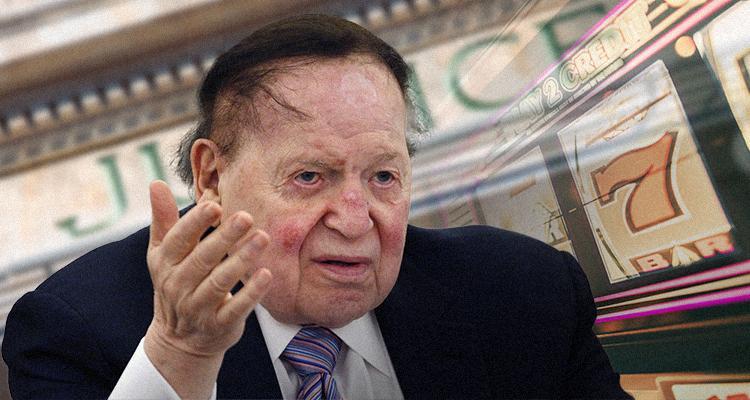Lobbyists allegedly working for American casino magnate, Sheldon Adelson (pictured), may have reportedly played a significant role in getting the United States Department of Justice (DOJ) to change its stance concerning sections of the Interstate Wire Act of 1961.
Shared liquidity nightmare:
According to a Friday report from The Wall Street Journal, the alteration was officially published by the DOJ’s Office of Legal Counsel last week and reversed a 2011 decision to make all iGaming activities involving an interstate transaction illegal. The newspaper explained that the government’s shift is set to seriously hurt American online casino and poker sites by making it almost impossible for them to operate across state lines or utilize shared liquidity from multiple jurisdictions.
Land-based opposition:
The Wall Street Journal reported that Adelson serves is Chairman and Chief Executive Officer for giant American casino operator Las Vegas Sands Corporation and has long argued that legalized online gambling drives down revenues at his firm’s land-based venues. The 85-year-old purportedly supported the successful 2016 Presidential campaign of Donald Trump via donations worth tens of millions of dollars and has also claimed that the prevalence of iGaming may lead to rises in addiction and underage gambling.
Lobbyists memo:
The newspaper reported that an unnamed lobbyist supposedly employed by Las Vegas Sands Corporation had written a 16-page memo in February of 2017 arguing that the 2011 conclusion should be reversed as the wording of the Interstate Wire Act appeared to prohibit all forms of iGaming and not just sportsbetting. This communication allegedly utilized information that had been prepared by a law firm headed by former senior DOJ official Charles Cooper, who would later go on to become a personal lawyer for then-Attorney General, Jeff Sessions.
employed by Las Vegas Sands Corporation had written a 16-page memo in February of 2017 arguing that the 2011 conclusion should be reversed as the wording of the Interstate Wire Act appeared to prohibit all forms of iGaming and not just sportsbetting. This communication allegedly utilized information that had been prepared by a law firm headed by former senior DOJ official Charles Cooper, who would later go on to become a personal lawyer for then-Attorney General, Jeff Sessions.
Analysis passed on:
The Wall Street Journal reported that April of 2017 had seen a second lawyer and lobbyist representing Las Vegas Sands Corporation, Darryl Nirenberg, allegedly pass on this memo to ‘top officials’ in the DOJ who, in turn, had forwarded it to the Office of Legal Counsel along with a note that had asked the advisory unit ‘to reconsider the 2011 opinion’s conclusion that the Wire Act is limited to sports gambling.’
Altered opinion:
The newspaper reported that the Office of Legal Counsel went on to change its stance on iGaming in November before officially publishing the particulars of its alterations last week. This purportedly came after Sessions had been forced to recuse himself from all matters dealing with iGaming due to the perceived conflict of interest presented by his ongoing relationship with Cooper, who had led the Office of Legal Counsel during the Administration of President Ronald Reagan.
DOJ maintains probity:
When asked about the undue influence allegations, the DOJ reportedly told The Wall Street Journal that neither ‘Adelson nor any outside parties’ had been consulted regarding the decision from the Office of Legal Counsel although it did admit to being in possession of the controversial legal analysis.
Sessions’ pledge:
The Office of Legal Counsel reportedly acknowledged the unusualness of its decision to reverse its 2011 stance but declared that it did ‘not lightly depart from our precedent’ and was embracing ‘the long traditions of general adherence to executive branch legal precedent.’ The newspaper cited an unnamed DOJ official as detailing that the change had been part of a pledge Sessions had made to Congress shortly after being named Attorney General in February of 2017 that he would re-examine the nation’s laws on iGaming.


